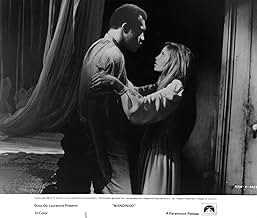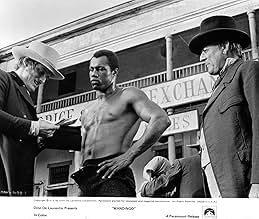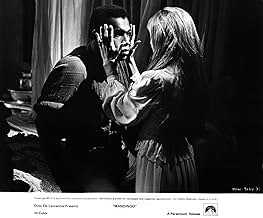AVALIAÇÃO DA IMDb
6,5/10
4,5 mil
SUA AVALIAÇÃO
Um proprietário de escravos dos anos 1840 treina um de seus escravos para ser um lutador de luta livre.Um proprietário de escravos dos anos 1840 treina um de seus escravos para ser um lutador de luta livre.Um proprietário de escravos dos anos 1840 treina um de seus escravos para ser um lutador de luta livre.
- Direção
- Roteiristas
- Artistas
- Prêmios
- 1 vitória no total
Debbi Morgan
- Dite
- (as Debbie Morgan)
- Direção
- Roteiristas
- Elenco e equipe completos
- Produção, bilheteria e muito mais no IMDbPro
Avaliações em destaque
Mandingo seems to divide it's audience strongly between love and hate and that's not really surprising; the film features some real nasty elements and the way that it's all done with a highly quality 'period drama' sort of style means that it will likely miss it's supposed intended audience - although it seems to have found a good fan base among exploitation fans. The film is liable to shock modern audience for its racial themes and strong racial tone; it didn't bother me all that much to be honest as it suits the film within it's context and helps to enforce its exploitative nature, which in turn makes Mandingo more powerful. The film takes place in the south of America during the 1840's and the main focus of the plot is on slavery. White farm owner Hammond Maxwell one day discovers the fighting talent of one of his black slaves and soon decides to toughen him up for battle with other slaves. He's sympathetic with his slaves and soon becomes affectionate with one of the women, which doesn't sit well with his wife Blanche who, for revenge, forces the top fighter to sleep with her.
Anyone going into this film expecting a serious look at slavery will be either disappointed or annoyed (maybe both), but if you go into it expecting some nasty exploitation, you might find a lot to like. The film gives an unflinching look at a more primitive society and it actually more shocking for its tone and implications than the events that take place in it (although the film does include plenty of racism, torture and rape scenes). The way that the film depicts the black slaves as animals makes for uncomfortable viewing and the way that society was segregated into 'white masters' and 'black slaves' is always enforced on the viewer. The performances sit better with the exploitation side of the film rather than the serious drama side as none of them are particularly brilliant; although the three leads do fit into their roles well. Overall, this is clearly not a film for everyone and I'm not in any way saying that the film's bad reputation is in any way undeserved; but Mandingo is certainly an interesting film and I would say it is at least worth seeing.
Anyone going into this film expecting a serious look at slavery will be either disappointed or annoyed (maybe both), but if you go into it expecting some nasty exploitation, you might find a lot to like. The film gives an unflinching look at a more primitive society and it actually more shocking for its tone and implications than the events that take place in it (although the film does include plenty of racism, torture and rape scenes). The way that the film depicts the black slaves as animals makes for uncomfortable viewing and the way that society was segregated into 'white masters' and 'black slaves' is always enforced on the viewer. The performances sit better with the exploitation side of the film rather than the serious drama side as none of them are particularly brilliant; although the three leads do fit into their roles well. Overall, this is clearly not a film for everyone and I'm not in any way saying that the film's bad reputation is in any way undeserved; but Mandingo is certainly an interesting film and I would say it is at least worth seeing.
I can see why this was controversial, and no doubt it would be if it were released now (2013). It's stunningly unlike Gone with the Wind. The style is extreme Southern Gothic, (not to be confused with camp). Some shades of Tennessee Williams but goes beyond where he dared. The dialogue is a bit difficult, and DVD has no English subtitles, but you'll be rewarded if you stick with it. (No need to understand every word). I agree that Tarantino was influenced by it but his approach to the subject matter is very different. Mandingo stands on its own as a major work of the 1970s and it's certainly a film that deserves to be better known. Striking photography and music throughout. This film panders to no one, nor does it simplistically tell the viewer what to think about anything. We have the feeling we're on our own with this. Maybe it's no accident that that feels liberating. Fasten your seat belts and see it.
This unflinching, hard-hitting look at slavery is a severely underrated and misjudged film. That's probably because it sheds light onto a tough, painful subject that many people would prefer to ignore or forget; if you're expecting a "slaves-and-masters-are-all-a-big-happy-family" depiction of the life in the mid-19th-century Southern plantations, then this simply isn't your movie.
"Mandingo" was followed, one year later, by "Drum". They are both far better films than their reputations might make you believe, and they are also handsome, almost sumptuous productions with a far lower "sleaze" quotient than many reviews seem to indicate. They are both worth seeing - preferably as a double bill. (***)
"Mandingo" was followed, one year later, by "Drum". They are both far better films than their reputations might make you believe, and they are also handsome, almost sumptuous productions with a far lower "sleaze" quotient than many reviews seem to indicate. They are both worth seeing - preferably as a double bill. (***)
This film is not for the faint of heart, this film is for hardcore truth viewers who aren't squeamish, the film may be dated but the essence is truthful & too the point, this film should be "Mandatory" for students taking a U.S. or African American history course.
1975's "Mandingo" earned much scorn from such highbrow critics as Roger Ebert, such was its unflinching look at slave relations in the Antebellum South, including numerous interracial couplings featuring full frontal nudity. The series of Falconhurst novels began with Kyle Onstott's original 1958 publication of "Mandingo," named for a specific type of fighter from the West African Niger region, also known for its later use by Alex Haley in his largely fictional yet compelling family history "Roots," the miniseries still two years away from its debut broadcast. Producer Dino De Laurentiis spent a number of years trying to finalize a deal, and with the relaxation of the old ratings system could never have filmed such a sordid tale until the 70s, a decade of untold exploitation where 'anything goes,' and often did. Director Richard Fleischer initially turned the assignment down but finally relented, James Mason earning top billing as plantation owner Warren Maxwell, in a role rejected by James Cagney and Charlton Heston, Perry King as son Hammond in place of Jan-Michael Vincent, Jeff Bridges, Beau Bridges, and Timothy Bottoms. Hammond is mostly portrayed as a sympathetic figure toward his slaves, often at odds with his harder edged father, his subsequent marriage to cousin Blanche (Susan George) soured on their wedding night by her less than virginal countenance under the sheets (as was so often the case, the girl was deflowered by her own brother). Hammond's purchase of new 'bed wench' Ellen (Brenda Sykes) does not go unnoticed by an increasingly irrational Blanche, eventually taking revenge on her faithless spouse by summoning Mandingo fighter Mede (Ken Norton) to her bed, producing a non white child that is quietly allowed to bleed to death, poor Blanche poisoned and defenseless Mede shot, scalded, and butchered by pitchfork. Critics were appalled by the brutality of Norton's no holds barred fight scenes, and the nihilistic climax left audiences appropriately stunned, a game cast putting forth a great effort to bring such unhappiness to vivid life. Interiors are effectively dark and gloomy, furniture sparse and guests rarely in evidence, slaves variously bought and sold to keep the rundown plantation afloat (location shooting in Louisiana). Susan George gives an uncanny rendition of Bette Davis in a part that few actresses would brave, and even at the end still earns sympathy making tearful entreaties to her unfeeling husband. James Mason and Perry King also acquit themselves well, as does Richard Ward as the intelligent Agamemnon punished for being able to read, and Ji-Tu Cumbuka, later Kunta Kinte's Wrestler on ROOTS, making the strongest impression as a runaway slave who prefers death to a life enchained. Personal preference impacts how one sees this picture, slowly gaining increased stature over the years, and certainly better than its immediate sequel "Drum," Ken Norton returning as a new character.
Você sabia?
- CuriosidadesJames Mason admitted in interviews that he only made the film to make his alimony payments.
- Erros de gravaçãoDuring Mede's first fight in the city, he and his opponent are wrestling on the grass. When they roll over on the floor, the grass moves like a slipping carpet would, revealing it to be a sheet of artificial green, probably lying on the floor of a sound stage.
- Versões alternativasThe international version of the film (released on PAL region 2 DVD) contains a different cut of the film that runs approx. 5 minutes shorter than the U.S. release but also has many scenes presented in alternate clothed takes. In all 12 scenes were either trimmed or re-edited with alternate shots/angles/takes:
- Scene where slave is bent over and inspected for hemorrhoids is cut.
- Scene where the wench is being prepared for her deflowering is presented in an alternate take where her breasts are not exposed.
- Scene with pregnant wench is shot with alternate angles to obscure nudity. Perry King's full frontal nudity is cut and replaced with a closer shot that reveals he is wearing shorts when he kneels down to pray (It looks like a goof - only a bit of the waistband can be seen at the corner of the frame).
- Alternate takes of the slave being strung up to be beaten are used to obscure nudity, and many shots of him being beat and left bloody are cut.
- A few seconds where Perry King's cousin rips off a wench's dress and bends her over to begin beating her is cut to remove nudity. The beating is left intact.
- The slave market scene is edited to remove the topless wenches on display, and the shot where the German widow sticks her hand into Ken Norton's shorts and "inspects" him is cut short. The second shot with her hand in and then removing it is left intact though.
- An alternate take is used with a prostitute clothed rather than nude at the bawdy house.
- A few seconds of a prostitute rubbing on Perry King's crotch is cut.
- An alternate take is used during the fight at the bawdy house so that a prostitute is seen holding her dress up while she cheers whereas in the original she lets it fall and her breasts be exposed.
- The entire scene between Perry King and Brenda Sykes in which she asks him if he'll let their child go free is presented in alternate clothed takes. In the original film they are both completely nude. Even the camera angles and setups are the same, only with clothes in the international version.
- In the scene where Ken Norton fights a man to death one long shot where the other fighter claws his back is cut. Also cut is when Ken bites down on the other fighter's neck, is pulled off, and then bites into his neck again. All the close-ups are cut.
- The Susan George/Ken Norton love scene is almost entirely missing. Ken Norton's nudity is cut, and then the scene ends in an alternate take when the two go out of frame onto the bed. The original scene went on for much longer and exposed Ken Norton's buttocks and Susan George's breasts. The German theatrical version does not feature any of these alterations and is identical to the U.S. release.
- ConexõesFeatured in Sooner or Later (1979)
- Trilhas sonorasBorn in This Time
Music by Maurice Jarre
Lyrics by Hitide Harris (as Hi Tide Harris)
Sung by Muddy Waters
[Played during opening title and credits]
Principais escolhas
Faça login para avaliar e ver a lista de recomendações personalizadas
Detalhes
Bilheteria
- Faturamento bruto nos EUA e Canadá
- US$ 2.433.010
- Tempo de duração
- 2 h 7 min(127 min)
- Mixagem de som
- Proporção
- 1.85 : 1
Contribua para esta página
Sugerir uma alteração ou adicionar conteúdo ausente



































